Boutique Hotel Business Plan Blueprint: Complete Guide
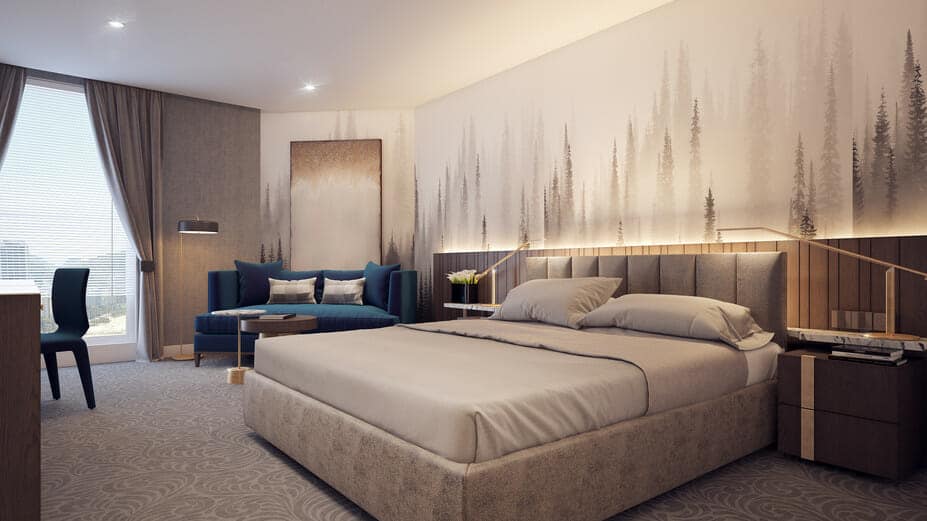
Whether you’re looking to raise funding from private investors or to get a loan from a bank (like a SBA loan) for your boutique hotel, you will need to prepare a solid business plan.
In this article we go through, step-by-step, all the different sections you need in the business plan of your boutique hotel. Use this template to create a complete, clear and solid business plan that get you funded.
1. Boutique Hotel Executive Summary
Though the executive summary is the first and the most important section, it should normally be the last section you write because it will have the summary of different sections included in the entire plan.
Why do you need a business plan for a boutique hotel?
The purpose of a business plan is to secure funding through one of the following channels:
- Obtain bank financing or secure a loan from other lenders (such as a SBA loan)
- Obtain private investments from investment funds, angel investors, etc.
- Obtain a public or a private grant
How to write your boutique hotel’s executive summary?
Provide a precise and high-level summary of every section that you have included in your business plan. The information and the data you include in this segment should grab the attention of potential investors and lenders immediately.
Also make sure that the executive summary doesn’t exceed 2 pages in total: it’s supposed to be a summary for investors and lenders who don’t have time to scroll through 40-50 pages, so keep it short and brief.
The executive summary usually consists of 5 major sub-sections:
- Business overview: explain what is the concept of your hotel, whom it targets (business travelers vs. tourists), where it’s located, its size and any other amenities and services you offer
- Market & competitive overview: start by describing the state of the hotel industry in your area (the city or region where you plan to open yours). Also explain here the level of competition you expect from similar establishments. Finally, mention who are your target customers (your ideal customers) ie. their age, gender, disposable income as well as their preferences
- Sales & marketing strategy: describe how you plan to acquire new customers, outlining the exact marketing channels you intend to use and your overall budget
- Management & People: this section should provide information about the leadership hierarchy, highlighting the roles and responsibilities of every team member and their experience
- Financial plan: how much profit and revenue do you expect in the next 5 years? When will you reach the break-even point and start making profits? You can include here a chart depicting your key financials such as revenue, gross profits, and net profit
- Funding ask: what loan/investment/grant are you seeking? How much are you raising? How long will this last?
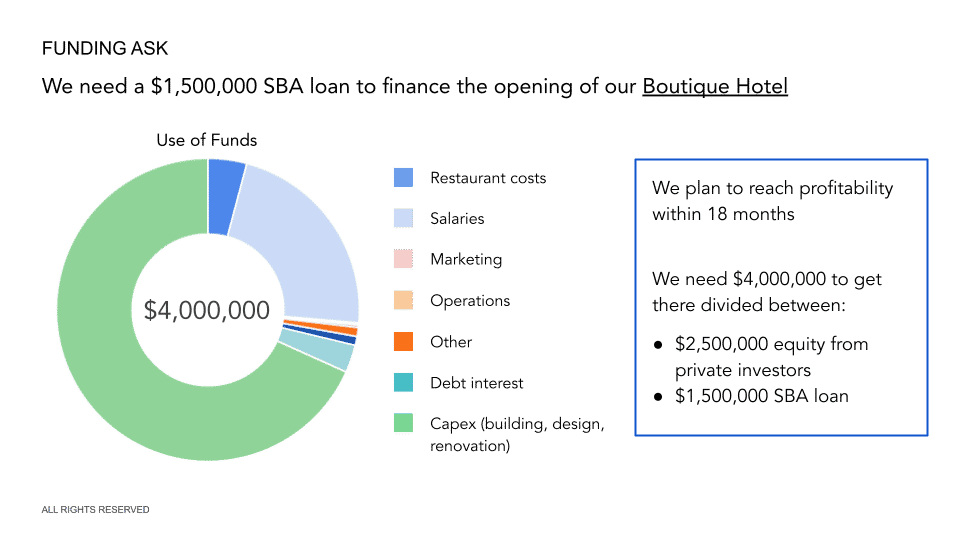
2. Boutique Hotel Business Overview
This is the section where you will provide details about your boutique hotel and its concept. You must address some important questions that lenders and/or investors generally ask.
Here is a quick list of some of those questions you must address:
- What is the rationale behind you opening this type of hotel today?
- What’s the location of the hotel and why did you select that location?
- What hospitality services and products will you provide? Will you offer any special services (massage, gym, etc.)?
- Will there be a restaurant?
- How many employees will you need to run the hotel?
- How many rooms will you have to accommodate your guests?
- What types of rooms will you offer your customers? At what rates?
- What will be the legal structure of your company?
a) History of the Project
Any business must have two components:
- Passion & experience of the business owner
- Rationale behind starting this type of business today
Passion & experience
Starting a huge investment like a boutique hotel requires much more than just capital. It also needs the relevant background experience in the hospitality industry.
Typically, many individuals creating their own boutique hotel will have a long-standing passion and track record for the hospitality industry. Yet, if you lack the experience, it probably isn’t the right time to start your boutique hotel. Instead, you can choose a franchising option and work with an established hotel franchise.
Rationale
What motivates you to start a boutique hotel in the region today? Unlike some other businesses, a boutique hotel requires a lot of financial and human capital investment.
So, before taking your first steps in this field, provide enough reasons to justify your decision to venture into the business. For instance, if there’s a scarcity of stylish boutique hotels targeting tourists in the region, you can use that to justify your reasons for starting one.

b) Hotel Concept
Describe your boutique hotel’s concept. Here are a few questions you may answer here:
- Will you target a specific market (all-inclusive vs. tourists, business travelers, etc.)?
- What types of rooms will you have (midscale, upscale, luxury?)
- What amenities will you offer your guests? A restaurant, rooftop bar, a SPA, a conference/meeting room? See more on amenities in the next section
- What will be the hotel’s design, layout and surface?
- Where will the boutique hotel be located? Is this next to a busy street, an airport, a tourist attraction or a corporate center?
c) Services & Facilities
Prioritize the most sought-after services in the region. While many boutique hotels offer the same services, you may want to differentiate yourself vs. competitors to attract guests.
Below are a few examples of the guest services you can provide depending on your target audience:
Boutique Hotel Services
- Bar / Restaurant
- Event management (weddings, conferences, etc.)
- Gym
- Concierge
- Laundry
Boutique Hotel Facilities
- Swimming pool / Jacuzzi
- Health Spa
- Business center
- Summer terrace
- Smoking rooms
- Fitness room
- Conference room
- Gift shop
- etc.
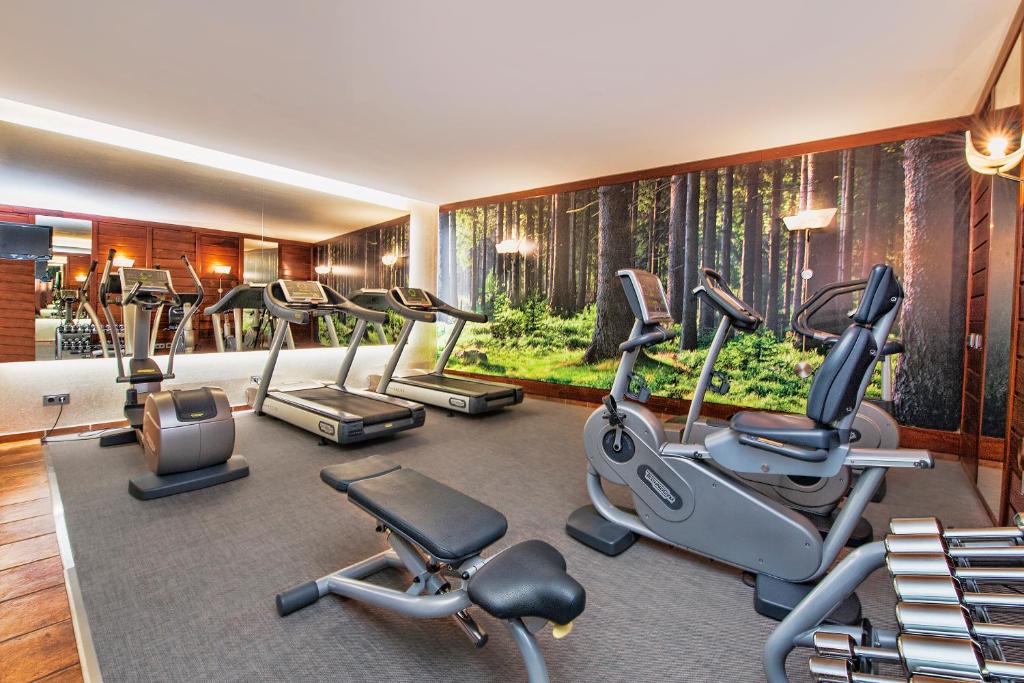
d) Room Rates
Next, describe your pricing strategy. Indeed, designing a pricing list for a boutique hotel isn’t the easiest thing to do. So, you can rely on information from some of your biggest competitors in the region to help you set standard rates.
Make sure to have a clear table with the different room categories and their daily rate. If you have off-peak vs. peak rates, make sure to include it too here. It doesn’t need to be exact (as the rates will likely change over time), so use price ranges instead.
e) Legal Structure
Finally, your business overview section should specify what type of business structure you want:
- Is this a corporation or a partnership (LLC)?
- Who are the investors? How much equity percentage do they own?
- Is there a Board of Directors? If so, whom? Do they have experience in the industry?
3. Boutique Hotel Market Overview
Provide comprehensive information about your market. You will want to tailor your services to suit the target audience. And that means you will need accurate information about the hospitality industry in your region:
- Industry size & growth: how big is the boutique hotel industry in your area? Is it growing / declining, and what are the factors contributing to its growth/decline?
- Competition overview: how many competitors are there? How do they compare vs. your hotel? Are they franchises or independent boutique hotels? Do they target the same guests as you do? How can you differentiate yourself from them?
- Customer analysis: who is your target market? Are they business travelers or tourists, single travelers, couples or families? How often do they travel and need an hotel? How much do they spend on average on hotel stays?
a) Boutique Hotel Industry Size & Growth
How big is the boutique hotel industry in the US?
The market size of boutique hotels in the US is estimated to be $16.9 billion in 2022.
Also, there are about 5,500 boutique hotel businesses in the country, meaning the annual turnover for each boutique hotel is around $3,000,000.
Another source estimated there were 4,600 boutique hotels in the US in 2021 and defines them as a high-end, independent hotel with less than 100 rooms and a unique design. The same source reported that boutique hotels accounted for 3.2% of total hotel rooms in the US in 2017, yet but 5.6% of the US hotel room revenue.
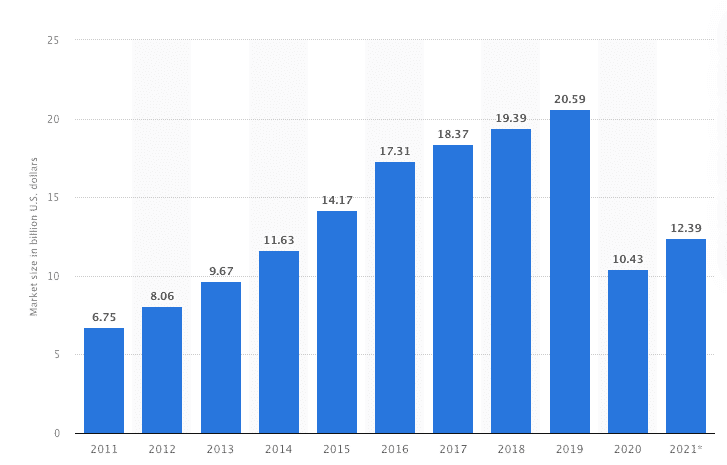
How big is the boutique hotel industry in your area?
After getting a clear picture of the boutique hotel industry in the US as a whole, narrow down to your location. Yet, you may not find this information anywhere (at least not for free). In that case, you can use our guide to estimate the TAM, SAM, and SOM for your business. Here is an example of how to do it:
We know the average annual turnover per boutique hotel is $3 million. Therefore, if the area where you want to open your hotel has 30 competitors (say, in a 30-mile radius), you can assume the boutique hotel industry in your area is worth $90 million.
How fast is the boutique hotel industry growing in your city?
The US boutique industry has suffered an unprecedented decline due to the pandemic. Indeed, it decreased from its peak at $20.6 billion in 2019 to $16.9 billion 2022, despite some recovery from its through.
But what about where you live? US national averages can be a great addition to your business plan, yet they don’t necessarily help to assess the boutique hotel industry where you want to open your own boutique hotel.
Instead, you can use the number of hotels as a proxy for market growth. For instance, if there were 28 boutique hotels in the region in 2020 and 30 in 2022, you can safely assume that the average annual growth rate is ~3% in your area.
The estimation above isn’t perfect as it disregard the occupancy rate. For example, if the 28 hotels had an occupancy rate of 20% in 2020, up to 50% in 2022, the market growth rate would actually be much higher i.e. 60% CAGR from 2020-22.

b) Competition Overview
This sub-section focuses on crucial information about your main competitors. Take a closer look at the hospitality services and products offered by other boutique hotels in the region. And while at it, analyze their marketing strategies, pricing structure, and anything you can do to stand out from the competition.
Don’t forget to include a comparative table, highlighting every piece of information the lenders may need when analyzing your business.
Here is a sample table that you can use:
| Competitor #1 | Competitor #2 | Competitor #3 | |
|---|---|---|---|
| Location | xx | xx | xx |
| Business model (and restaurant type) | Franchise Resort | Boutique hotel | Boutique hotel |
| Target audience | Families, business travelers | Couples | Couples, business travelers |
| Restaurant | Yes | Yes | No |
| Google Rating | 4.3 (520+) | 4.7 (450+) | 4.5 (1,000+) |
| Pricing range (midscale room) | $130-160 | $170-$250 | $180-$240 |
| Number of rooms | 40 | 15 | 25 |
| Amenities | Gym Conference center Swimming pool | Gym Health Spa Swimming pool | Gym Health Spa Swimming pool Conference center |
c) Customer Analysis
Customer analysis is all about knowing your ideal guests: who exactly are you targeting?
You can narrow it down with the following questions:
- Demographics (age, gender, single vs. couples, etc.)
- Frequency of visits (how often do they need such services?)
- Average disposable income
- Average spend per stay (hotel, restaurant, other)
- Favorite services (e.g. gyms, spas, etc.)

4. Sales & Marketing Strategy
This section should highlight the strategies you have in place to attract potential clients. Try to answer the following questions:
- What are your unique selling points (USPs)?
- Which marketing strategies will you use to attract new clients?
- How will you track the success of your marketing strategy?
- What is your customer acquisition cost (CAC)?
- What is your marketing budget?
- Will you consider any offers or promotions to attract new clients?
What marketing channels do boutique hotels use?
Like any new business, a boutique hotel requires comprehensive marketing during the first months to attract potential clients.
You can resort to the following channels to help you get new clients, even from your main competitors:
- Online local listing (Google reviews)
- Online booking platforms (Booking.com, Tripadvisor, etc.)
- Social media content & ads: for example encourage your guests to post on social media and / or hire a social media content manager who will create daily posts and manage your social media presence
- PPC ads (Google Ads)
- Word of mouth, recommendations
- Signage
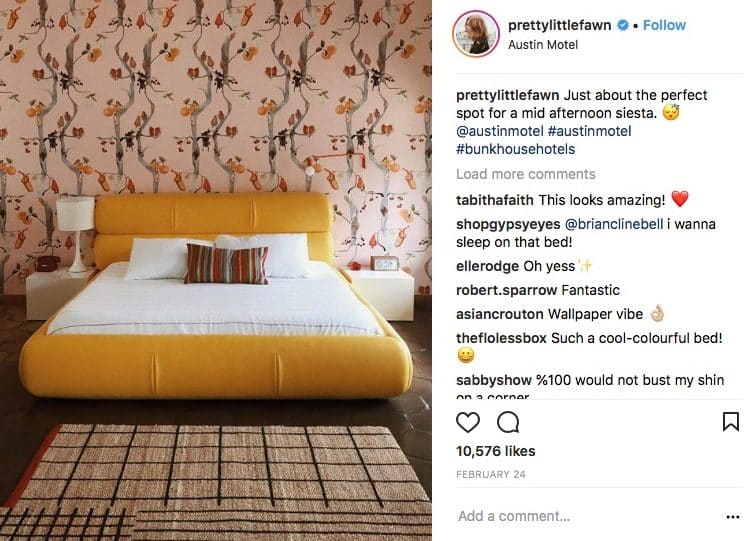
What are your Unique Selling Points (USPs)?
In other words, how do you differentiate yourself vs. competitors? This is very important as you might need to win customers from competitors. A few examples of USPs are;
- Quality of services: you may offer high-quality services (e.g. luxury suites, fine dining restaurant, etc.)
- Pricing: your boutique hotel may be cheaper vs. competitors for the same quality of service
- Location: setting up your boutique hotel near your target market gives you the upper hand
- Amenities: you may be the only boutique hotel in the area offering a health SPA, a separate event center for weddings, etc.
5. Management & People
You must address 2 things here:
- The management team and their experience
- The organizational structure: different team members and who reports to whom
Management
Small businesses often fail because of managerial weaknesses. Thus, having a strong management team is vital. Highlight the experience and education of senior managers that you intend to hire to oversee your hotel business.
First, describe their duties, responsibilities, and roles. Also, highlight their previous experience and explain how they succeeded in their previous roles.
Organization Structure
Even if you haven’t already hired a general manager, administrative staff, receptionists, chefs, and other relevant staff members, you must provide a chart of the organizational structure defining hierarchy and reporting lines.

6. Financial Plan
The financial plan is perhaps, with the executive summary, the most important section of any business plan for a boutique hotel.
Indeed, a solid financial plan tells lenders that your business is viable and can repay the loan you need from them. If you’re looking to raise equity from private investors, a solid financial plan will prove them your boutique hotel is an attractive investment.
There should be 2 sections to your financial plan section:
- The startup costs of your project (if you plan to start a new hotel, renovate your hotel, adding rooms, etc.)
- The 5-year financial projections of your boutique hotel
a) Startup Costs
Before we expand on 5-year financial projections in the following section, it’s always best practice to start with listing the startup costs of your project. For a boutique hotel, startup costs are all the expenses you incur before you open your hotel and receive your first guests. These expenses typically are:
- The leasing deposit (if you rent) or the cost to buy the building (if you buy)
- Renovations and improvements
- Equipment & appliances
- Furniture & tableware
Of course, the startup costs depend on a number of factors, like the size of your hotel, its location, the facilities, etc.
On average, it costs $8,400,000 to $10,800,000 to build and open a small boutique hotel with 20 rooms (assuming you decide to build the hotel from scratch).
Note that these costs are for illustrative purposes and may not be fully relevant for your business. For more information on how much it costs to open and run a boutique hotel, read our article here.
| Startup cost | Amount | % of total startup costs |
|---|---|---|
| Construction | $5,000,000 – $6,000,000 | 55% – 65% |
| Land | $1,000,000 – $2,000,000 | 10% – 20% |
| Soft costs | $1,200,000 | 12% |
| FF&E | $1,200,000 – $1,600,000 | 12% – 16% |
| Total startup costs | $8,400,000 – $10,800,000 | 100% |
b) Financial Projections
In addition to startup costs, you will also need to build a solid 5-year financial model for your boutique hotel business plan.
Note that your financial projections should be built using a spreadsheet (e.g. Excel or Google Sheets) and presented in the form of tables and charts in your business plan.
As usual, keep it concise here and save details (for example detailed financial statements, financial metrics, key assumptions used for the projections) for the appendix instead.
Your financial projections should answer at least the following questions:
- How much revenue do you expect to generate over the next 5 years?
- When do you expect to break even?
- How much cash will you burn until you get there?
- What’s the impact of a change in pricing (say 15%) on your margins?
- What is your average customer acquisition cost?
You should include here your 3 financial statements (income statement, balance sheet and cash flow statement). This means you must forecast:
- The number of nights booked over time ;
- Your expected revenue ;
- Operating costs to run the business ;
- The construction costs and FF&E expenses
When projecting your revenue, make sure to sensitize pricing, the expenses (salaries, utilities, supplies, etc.) and the number of stays (or booked nights). Indeed, a small change in these assumptions may have a significant impact on your revenues and profits.

7. Use of Funds
This is the last section of the business plan of your boutique hotel. Now that we have explained what your boutique hotel’s concept is, the amenities it offers, your marketing strategy, etc., this section must now answer the following questions:
- How much funding do you need?
- What financial instrument(s) do you need: is this equity or debt, both?
- How long will this funding last?
- Where else does the money come from? If you apply for a SBA loan for example, where does the other part of the investment come from (your own capital, private investors?)
If you raise debt:
- What percentage of the total funding the loan represents?
- What is the corresponding Debt Service Coverage Ratio?
If you raise equity
- What percentage ownership are you selling as part of this funding round?
- What is the corresponding valuation of your business?
Use of Funds
Any business plan for a boutique hotel should include a clear use of funds section. This is where you explain how the money will be spent.
Will you spend most of the loan / investment in paying for construction costs? Or will it cover mostly renovation and furniture costs?
For the use of funds, we also recommend using a pie chart like the one we have in our financial model template where we outline the main expenses categories as shown below.






